In Focus This Week
Countdown to November 5
State election officials on the ballot
By M. Mindy Moretti
electionline.org
The top elections official spot is on the ballot in seven states this November.
Of the seven races — Missouri, Montana, Oregon, Utah, Vermont, Washington and West Virginia — three of the seats are open.
In Missouri Secretary of State Jay Ashcroft chose not to seek re-election, in West Virginia Secretary of State Mac Warner was term-limited and in Oregon, Secretary of State LaVonne Griffin-Valade was appointed in 2023 and chose not to seek the seat.
This is just a brief look at all the candidates with links to their campaign websites where available.
 Missouri – It’s a four-way race for secretary of state in the Show Me state between Barbara Phifer (D), Denny Hoskins (R), Jerome H. Baur (G) and Carl Herman Freese (L). Phifer won a three-way primary with 40% of the vote. Hoskins won the crowded GOP primary with 24.2% of the vote.
Missouri – It’s a four-way race for secretary of state in the Show Me state between Barbara Phifer (D), Denny Hoskins (R), Jerome H. Baur (G) and Carl Herman Freese (L). Phifer won a three-way primary with 40% of the vote. Hoskins won the crowded GOP primary with 24.2% of the vote.
Phifer currently represents St. Louis County (District 90) in the Missouri House of Representatives. She was elected to her first two-year term in November 2020. Prior to serving in the legislature, Phifer was a United Methodist pastor for more than 40 years.
Hoskins was first elected to the Missouri Senate in 2016 after serving eight years in the Missouri House of Representatives. He is a CPA and served in the Missouri Army National Guard.
 Montana – Incumbent Secretary of State Christi Jacobsen (R) faces two challengers, Jesse James Mullen (D) and John Lamb (L).
Montana – Incumbent Secretary of State Christi Jacobsen (R) faces two challengers, Jesse James Mullen (D) and John Lamb (L).
Jacobsen was first elected to the secretaries office in 2020. Prior to that she served as deputy secretary of state. She began her career in the telecom industry. Her current duties in the secretary of state’s office while deputy included working to replace the IT elections system.
Mullen is a business owner and entrepreneur. He built Mullen Newspaper Company from two newspapers in Granite and Powell counties to 21 newspapers in six states over the last six years. He also owns Browsing Bison Books in Deer Lodge.
 Oregon – It’s a three-way race for the open seat in Oregon. Tobias Read (D / Working Families Party / Independent Party), Dennis Linthincom (R / Constitution Party) and Nathalie Paravicini ((Pacific Green Party / Progressive Party) will all face off.
Oregon – It’s a three-way race for the open seat in Oregon. Tobias Read (D / Working Families Party / Independent Party), Dennis Linthincom (R / Constitution Party) and Nathalie Paravicini ((Pacific Green Party / Progressive Party) will all face off.
Read is currently the state Treasurer, a seat he was elected to in 2017. Prior to that, from 2007 to 2017, served as a state representative and senator. During his time in the House he served as majority whip as speaker pro tempore. He also worked for the U.S. Department of the Treasury.
Linthicum was first elected to the Oregon Senate in 2017. Prior to that he served as a county commission in Klamath County. Prior to that he worked in software development and database management.
Paravicini was born in Basel, Switzerland and earned a graduate degree from the University of Houston in 1990 and a Ph.D. from the National University of Natural Medicine in 2011. Paravicini’s career experience includes working as a doctor.
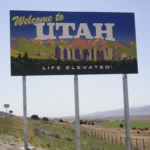 Utah – In Utah, the lieutenant governor has oversight of the state’s elections and there are eight candidates seeking the seat this year, three of which are write-ins.
Utah – In Utah, the lieutenant governor has oversight of the state’s elections and there are eight candidates seeking the seat this year, three of which are write-ins.
Incumbent Republican Lt. Gov. Diedre Henderson is the only candidate to face a primary, which she won by 54%. Before becoming lieutenant governor, Henderson was a state senator, a role she was first elected to in 2012. Prior to running for public office, Henderson served as Political Director and Campaign Manager for former Congressman Jason Chaffetz.
Democrat Rebekah Cummings is the director of digital matters for the University of Utah and the chair of the Utah State Library Board. She is a founding member of the Let Utah Read Coalition.
 Vermont – Incumbent Sarah Copeland Hanzas (D) will face H. Brooke Paige (R).
Vermont – Incumbent Sarah Copeland Hanzas (D) will face H. Brooke Paige (R).
Before being elected secretary of state in 2020, Comepland Hanzas served 18 years in the Vermont Legislature. In addition to that she owned and operated a small cafe in Bradford, Vermont.
While retired, H. Brooke Paige is not retired from running for office and has sought many offices at the state level throughout the years.
 West Virginia–In West Virginia, Democrat Thornton Cooper will face Republican Kris Warner.
West Virginia–In West Virginia, Democrat Thornton Cooper will face Republican Kris Warner.
Warner, who is the younger brother to current Secretary of State Mac Warner is currently the executive director of the West Virginia Economic Development Authority, a position he was appointed to by Gov. Jim Justice.
Cooper is an attorney and spent nearly three decades working in various state agencies.
 Washington–Incumbent Secretary of State Steve Hobbs (D) will face Dale Whitaker (R).
Washington–Incumbent Secretary of State Steve Hobbs (D) will face Dale Whitaker (R).
Hobbs was first appointed to the seat in 2021 and then won statewide election in 2022. Before becoming secretary of state Hobbs served in the Washington senate, and the U.S. Army, serving two tours of duty in Kosovo and Iraq. He is still a member of the Washington National Guard. Hobbs is the son of Japanese immigrants.
Whitaker emigrated to the United States from the United Kingdom in 2008 and became a U.S. citizen in 2015. He owns a small tax practice and is executive director of We Believe We Vote, a nonprofit that describes itself as “a Christian ministry providing resources to assist citizens in social, cultural, and governmental engagement based on Biblical truths and Constitutional principles.”
electionline Daily News Email
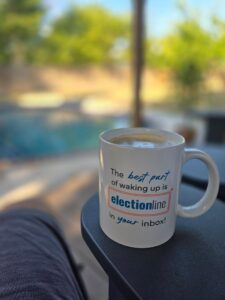 What’s the best part of waking up? electionline Daily News in your inbox of course so be sure to sign up for your daily dose.
What’s the best part of waking up? electionline Daily News in your inbox of course so be sure to sign up for your daily dose.
Each morning you’ll receive the top headlines of the day, plus a listing of states featured in that day’s news round up.
To sign up, simply visit our site and provide us with your email and you’ll begin receiving the news in your inbox each morning.
We Google so you don’t have to!
Election Security Updates
 CISA and USPIS Release Election Mail Security Resources: CISA and the United States Postal Inspection Service (USPIS) joined together to release an Election Mail Security Public Service Announcement and a training video for election officials on securely and safely handling potential toxic hazards in election mail. The PSA affirms the incredible efforts local and state officials have invested, through the federal government, in ensuring security and integrity of the elections process, and
CISA and USPIS Release Election Mail Security Resources: CISA and the United States Postal Inspection Service (USPIS) joined together to release an Election Mail Security Public Service Announcement and a training video for election officials on securely and safely handling potential toxic hazards in election mail. The PSA affirms the incredible efforts local and state officials have invested, through the federal government, in ensuring security and integrity of the elections process, and  specifically how seriously CISA and USPIS take the security of election related mail. As CISA leads federal efforts to ensure election officials have the resources they need to defend against the range of cyber and physical threats to election infrastructure, USPIS ensures the safe and secure delivery of election mail, and the protection of election officials from potentially dangerous mail. “CISA, alongside our federal partners like the US Postal Inspection Service, are committed to helping those on the frontline of our democratic process have the tools and resources necessary to accomplish their incredible mission while staying safe from the range of hazards they may face,” said CISA Director Jen Easterly. “Together we can protect America’s election infrastructure against new and evolving threats and that is our continued goal for Protect 2024 here at CISA.” To report suspicious mail and election mail-related security or criminal incidents contact USPIS at (877) 876-2455 or you can report election mail crimes at uspis.gov/report. To view the CISA and USPIS PSA and training video, please visit CISA and USPIS Election Mail Security Resources on CISA.gov. and check out #Protect2024 for the latest information regarding election security at CISA.
specifically how seriously CISA and USPIS take the security of election related mail. As CISA leads federal efforts to ensure election officials have the resources they need to defend against the range of cyber and physical threats to election infrastructure, USPIS ensures the safe and secure delivery of election mail, and the protection of election officials from potentially dangerous mail. “CISA, alongside our federal partners like the US Postal Inspection Service, are committed to helping those on the frontline of our democratic process have the tools and resources necessary to accomplish their incredible mission while staying safe from the range of hazards they may face,” said CISA Director Jen Easterly. “Together we can protect America’s election infrastructure against new and evolving threats and that is our continued goal for Protect 2024 here at CISA.” To report suspicious mail and election mail-related security or criminal incidents contact USPIS at (877) 876-2455 or you can report election mail crimes at uspis.gov/report. To view the CISA and USPIS PSA and training video, please visit CISA and USPIS Election Mail Security Resources on CISA.gov. and check out #Protect2024 for the latest information regarding election security at CISA.
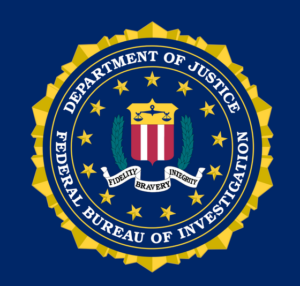 FBI and CISA Public Service Announcement: The FBI and CISA issued their final four-part joint public service announcement (PSA) today titled “Just So You Know: Foreign Threat Actors Likely to Use a Variety of Tactics to Develop and Spread Disinformation During the 2024 U.S. General Election Cycle.” This PSA highlights efforts by foreign actors to spread disinformation in the lead-up to the 2024 U.S. general election with the goal of casting doubt on the integrity of the democratic process and sowing partisan discord. Foreign adversaries are using a variety of sophisticated disinformation campaigns, often leveraging new tools, such as generative artificial intelligence (AI), to craft and spread misleading content. “As we approach Election Day, it is important to remember that while elections are political, election security is not. Election security is
FBI and CISA Public Service Announcement: The FBI and CISA issued their final four-part joint public service announcement (PSA) today titled “Just So You Know: Foreign Threat Actors Likely to Use a Variety of Tactics to Develop and Spread Disinformation During the 2024 U.S. General Election Cycle.” This PSA highlights efforts by foreign actors to spread disinformation in the lead-up to the 2024 U.S. general election with the goal of casting doubt on the integrity of the democratic process and sowing partisan discord. Foreign adversaries are using a variety of sophisticated disinformation campaigns, often leveraging new tools, such as generative artificial intelligence (AI), to craft and spread misleading content. “As we approach Election Day, it is important to remember that while elections are political, election security is not. Election security is  national security. Our foreign adversaries are looking to attack our democratic process to further their own objectives, and we need the help of all Americans in ensuring they are not successful,” said CISA Senior Advisor Cait Conley. “There has been incredible effort across local, state and federal governments to ensure the security and integrity of our nation’s election infrastructure. Americans should be confident that their votes will be counted as cast. They should also know that our foreign adversaries will try to make them believe otherwise. We encourage everyone to remain vigilant, verify the information they consume, and rely on trusted sources like their state and local election officials.” The PSA highlights specific examples of tactics we have seen used by Russia and Iran during the 2024 election cycle to target all Americans. These include things from mimicking national level media outlets like the Washington Post and Fox News and creating inauthentic news sites posing as legitimate media organizations to using paid influencers to hide their hand. It is important for voters to critically evaluate information sources, particularly as disinformation campaigns evolve to use AI-generated content. Both agencies urge the American public to rely on trusted information from state and local election officials and to verify claims through multiple reliable sources before sharing them on social media or other platforms. For more information on how to protect yourself from disinformation, visit the official websites of the FBI and CISA’s dedicated election security webpage, cisa.gov/Protect2024.
national security. Our foreign adversaries are looking to attack our democratic process to further their own objectives, and we need the help of all Americans in ensuring they are not successful,” said CISA Senior Advisor Cait Conley. “There has been incredible effort across local, state and federal governments to ensure the security and integrity of our nation’s election infrastructure. Americans should be confident that their votes will be counted as cast. They should also know that our foreign adversaries will try to make them believe otherwise. We encourage everyone to remain vigilant, verify the information they consume, and rely on trusted sources like their state and local election officials.” The PSA highlights specific examples of tactics we have seen used by Russia and Iran during the 2024 election cycle to target all Americans. These include things from mimicking national level media outlets like the Washington Post and Fox News and creating inauthentic news sites posing as legitimate media organizations to using paid influencers to hide their hand. It is important for voters to critically evaluate information sources, particularly as disinformation campaigns evolve to use AI-generated content. Both agencies urge the American public to rely on trusted information from state and local election officials and to verify claims through multiple reliable sources before sharing them on social media or other platforms. For more information on how to protect yourself from disinformation, visit the official websites of the FBI and CISA’s dedicated election security webpage, cisa.gov/Protect2024.
Election News This Week
 Mistakes Lead to Misinformation: From ballot errors to sensitive voting machines that are very particular about where your finger falls on the touchscreen, these problems aren’t new. However, this year, with mis-/disinformation spreading quickly on social media, it’s a whole different ball game. Already there have been issues in several early voting counties where officials have needed to debunk information being spread. Election officials in Whitfield County, Georgia worked to put to rest a rumor about a voting machine that printed a different selection than what a voter put on their ballot. It turned out that it was an error on the part of the voter, Georgia’s top state election official confirmed, but that didn’t stop people from spreading false information about the incident. “And then it got blown out of proportion by people that like to use, you know, Twitter and other forms of social media,” Secretary of State Brad Raffensperger said. “But we’re going to respond quickly to these sorts of things in 2024 because it’s not supported by the facts. The equipment’s working. We’ve done all sorts of audits, you know, since the last election, and coming up to this election.” In Tennessee, voters have reported the problem in Davidson, Williamson, and Shelby Counties. Officials said those using their fingers to cast their ballot on the touchscreen machines have reported their vote not registering, and instead, “jumping” to a different candidate. Davidson County election administrator Jeff Roberts told News 2 the problem is new, but it’s not related to the integrity of the machines. Misinformation about Lee County, Florida voting machines is spreading across social media, causing some people to be concerned that their votes may not count. Supervisor of Elections Tommy Doyle explained that the machines do contain a privacy screen that prevents anyone nearby from seeing the screen except the person using it, similar to a privacy screen protector some people place on their phones. “That means you really have to be aggressive when you make your marks or punch your choice,” Doyle said. He was aware of social media claims about the machines not working properly, but he insisted there had not been one single official complaint brought to his attention. Some of these ballot “errors” aren’t errors at all, but voters posting misleading information. In Tarrant County, Texas, one voter said a voting machine switched his choice for president, but county leaders said there was no evidence of that. On Tuesday, videos shared on social media showed a man claiming that when he voted in White Settlement, his printed ballot indicated a different choice for the presidential candidate than the one he made on the machine. Elections Administrator Clint Ludwig posted a social media message on X on Tuesday evening, saying the machine printed out the voter’s selection. “We have one individual who’s claimed that the vote that they selected on the machine was not the vote that was printed on the printed ballot. What we believe to have occurred is that the individual did make a selection on the machine and that selection was printed on their ballot. When they went to cast their ballot they checked it and realized that was not the vote that they wanted,” Ludwig said.
Mistakes Lead to Misinformation: From ballot errors to sensitive voting machines that are very particular about where your finger falls on the touchscreen, these problems aren’t new. However, this year, with mis-/disinformation spreading quickly on social media, it’s a whole different ball game. Already there have been issues in several early voting counties where officials have needed to debunk information being spread. Election officials in Whitfield County, Georgia worked to put to rest a rumor about a voting machine that printed a different selection than what a voter put on their ballot. It turned out that it was an error on the part of the voter, Georgia’s top state election official confirmed, but that didn’t stop people from spreading false information about the incident. “And then it got blown out of proportion by people that like to use, you know, Twitter and other forms of social media,” Secretary of State Brad Raffensperger said. “But we’re going to respond quickly to these sorts of things in 2024 because it’s not supported by the facts. The equipment’s working. We’ve done all sorts of audits, you know, since the last election, and coming up to this election.” In Tennessee, voters have reported the problem in Davidson, Williamson, and Shelby Counties. Officials said those using their fingers to cast their ballot on the touchscreen machines have reported their vote not registering, and instead, “jumping” to a different candidate. Davidson County election administrator Jeff Roberts told News 2 the problem is new, but it’s not related to the integrity of the machines. Misinformation about Lee County, Florida voting machines is spreading across social media, causing some people to be concerned that their votes may not count. Supervisor of Elections Tommy Doyle explained that the machines do contain a privacy screen that prevents anyone nearby from seeing the screen except the person using it, similar to a privacy screen protector some people place on their phones. “That means you really have to be aggressive when you make your marks or punch your choice,” Doyle said. He was aware of social media claims about the machines not working properly, but he insisted there had not been one single official complaint brought to his attention. Some of these ballot “errors” aren’t errors at all, but voters posting misleading information. In Tarrant County, Texas, one voter said a voting machine switched his choice for president, but county leaders said there was no evidence of that. On Tuesday, videos shared on social media showed a man claiming that when he voted in White Settlement, his printed ballot indicated a different choice for the presidential candidate than the one he made on the machine. Elections Administrator Clint Ludwig posted a social media message on X on Tuesday evening, saying the machine printed out the voter’s selection. “We have one individual who’s claimed that the vote that they selected on the machine was not the vote that was printed on the printed ballot. What we believe to have occurred is that the individual did make a selection on the machine and that selection was printed on their ballot. When they went to cast their ballot they checked it and realized that was not the vote that they wanted,” Ludwig said.
 Pups at the Polls: Three cheers to Palm Beach County’s Supervisor of Elections Wendy Sartory Link and her staff. In a blend of civic duty and community spirit, the Palm Beach County Supervisor of Elections has teamed up with four local animal rescue organizations to launch “Paws to the Polls.” The initiative comes after the state recovers from the aftermath of Hurricanes Helene and Milton. With shelters damaged from the storm, and at capacity, many of these animals are housed in Palm Beach County. As voters head to the polls during the early voting period— October 21 to November 3 —they will have the opportunity to meet and interact with adoptable pets from Palm Beach County Animal Care and Control, Big Dog Ranch, Kelly’s Fosters, and Barky Pines Animal Rescue. The Supervisor of Elections Office said this program initiative aims to make the voting experience more enjoyable while also addressing the surge in pets needing homes. “We believe that voting should be a positive experience,” said Sartory Link.. “By partnering with these incredible animal rescue organizations, we not only encourage voter participation but also help find loving homes for pets in need.”
Pups at the Polls: Three cheers to Palm Beach County’s Supervisor of Elections Wendy Sartory Link and her staff. In a blend of civic duty and community spirit, the Palm Beach County Supervisor of Elections has teamed up with four local animal rescue organizations to launch “Paws to the Polls.” The initiative comes after the state recovers from the aftermath of Hurricanes Helene and Milton. With shelters damaged from the storm, and at capacity, many of these animals are housed in Palm Beach County. As voters head to the polls during the early voting period— October 21 to November 3 —they will have the opportunity to meet and interact with adoptable pets from Palm Beach County Animal Care and Control, Big Dog Ranch, Kelly’s Fosters, and Barky Pines Animal Rescue. The Supervisor of Elections Office said this program initiative aims to make the voting experience more enjoyable while also addressing the surge in pets needing homes. “We believe that voting should be a positive experience,” said Sartory Link.. “By partnering with these incredible animal rescue organizations, we not only encourage voter participation but also help find loving homes for pets in need.”
 The Kids are Alright: This year, for the first time, the D.C. Board of Elections used high school summer interns in addition to college interns. Nick von Hindenburg, a student at Georgetown Day School was assigned typical intern duties such as outreach, voter services, and election worker training assistance. But von Hindenburg had an additional idea. He wanted to create a poll worker recruitment website. “ Nick had this idea when he began with us,” explained Monica Evans, director of the D.C. Board of Elections. “ We encouraged him [and w]e helped him refine the tool. We were impressed by his enthusiasm.” Evand said he worked with the DCBOE web designer to assist with the refinement of the site. von Hindenburg messaged Evans after this internship was over to let her know how things were going with the site. “We are circulating the website at GDS, including sending all school emails, meeting with the community engagement office, and doing announcements at assemblies. We are also proud to say we have already got some people who filled out the DC election worker application form. Furthermore, we are talking with students and faculty at other schools in the DMV about getting the word out about the website and volunteering as election workers.”
The Kids are Alright: This year, for the first time, the D.C. Board of Elections used high school summer interns in addition to college interns. Nick von Hindenburg, a student at Georgetown Day School was assigned typical intern duties such as outreach, voter services, and election worker training assistance. But von Hindenburg had an additional idea. He wanted to create a poll worker recruitment website. “ Nick had this idea when he began with us,” explained Monica Evans, director of the D.C. Board of Elections. “ We encouraged him [and w]e helped him refine the tool. We were impressed by his enthusiasm.” Evand said he worked with the DCBOE web designer to assist with the refinement of the site. von Hindenburg messaged Evans after this internship was over to let her know how things were going with the site. “We are circulating the website at GDS, including sending all school emails, meeting with the community engagement office, and doing announcements at assemblies. We are also proud to say we have already got some people who filled out the DC election worker application form. Furthermore, we are talking with students and faculty at other schools in the DMV about getting the word out about the website and volunteering as election workers.”
 Podcast News: In the latest episode of the Tour Guide Tell All, join the Rebeccas as they dive in deep to the Election of 1892, a pivotal “rematch” election between the incumbent, Benjamin Harrison, and former President Grover Cleveland, who becomes the first, and so far only, president to win re-election after losing an intervening election. Radiolab scrutinizes one proposed tweak to the way we vote that could make politics in this country more representative, more moderate, and most shocking of all, more civil. Could this one surprisingly do-able mathematical fix really turn political campaigning from a rude bloodsport to a campfire sing along? And even if we could do that, would we want to? Election season is just around the corner and Cate Blackford of the Maine Beacon connected with Secretary of State Shenna Bellows to help educate folks on their voting rights. Bellows also offers an inside look of the electoral security process that ensures all votes are counted accurately. On CNN’s Political Briefing, political correspondent Sara Murray joins CNN Political Director David Chalian to discuss what election officials are doing to combat disinformation and avoid repeating problems from 2020. They also discuss the “neighborhood fights” playing out in Wisconsin over ballot drop boxes and why you shouldn’t be surprised if tallying votes in Pennsylvania takes a long time. On the latest episode of Race Unwrapped, Selene Gomez, National Outreach Director for VoteRiders joins host Michelle Tyrene Johnson to talk about how voter ID laws hinder voter participation. In a recent episode of The Poynter Report Podcast, NBC News’ Steve Kornacki looks at why America’s decentralized voting system is a good fail-safe against election fraud. Michigan Public Radio’s It’s Just Politics podcast takes a look at why Elon Musk is name-checking Secretary of State Jocelyn Benson. WBEZ’s The Reset with Sasha-Ann Simons looks at the push to restore prisoners’ voting rights in Illinois.
Podcast News: In the latest episode of the Tour Guide Tell All, join the Rebeccas as they dive in deep to the Election of 1892, a pivotal “rematch” election between the incumbent, Benjamin Harrison, and former President Grover Cleveland, who becomes the first, and so far only, president to win re-election after losing an intervening election. Radiolab scrutinizes one proposed tweak to the way we vote that could make politics in this country more representative, more moderate, and most shocking of all, more civil. Could this one surprisingly do-able mathematical fix really turn political campaigning from a rude bloodsport to a campfire sing along? And even if we could do that, would we want to? Election season is just around the corner and Cate Blackford of the Maine Beacon connected with Secretary of State Shenna Bellows to help educate folks on their voting rights. Bellows also offers an inside look of the electoral security process that ensures all votes are counted accurately. On CNN’s Political Briefing, political correspondent Sara Murray joins CNN Political Director David Chalian to discuss what election officials are doing to combat disinformation and avoid repeating problems from 2020. They also discuss the “neighborhood fights” playing out in Wisconsin over ballot drop boxes and why you shouldn’t be surprised if tallying votes in Pennsylvania takes a long time. On the latest episode of Race Unwrapped, Selene Gomez, National Outreach Director for VoteRiders joins host Michelle Tyrene Johnson to talk about how voter ID laws hinder voter participation. In a recent episode of The Poynter Report Podcast, NBC News’ Steve Kornacki looks at why America’s decentralized voting system is a good fail-safe against election fraud. Michigan Public Radio’s It’s Just Politics podcast takes a look at why Elon Musk is name-checking Secretary of State Jocelyn Benson. WBEZ’s The Reset with Sasha-Ann Simons looks at the push to restore prisoners’ voting rights in Illinois.
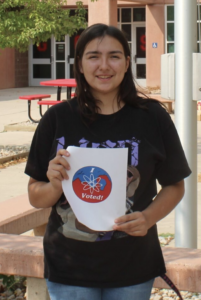 Sticker News: Congratulations to Grand County High School junior Violet Begay for winning Moab County, Utah’s “I Voted” sticker contest for 2024. “The idea was originally a wagon wheel,” Begay said, until she
Sticker News: Congratulations to Grand County High School junior Violet Begay for winning Moab County, Utah’s “I Voted” sticker contest for 2024. “The idea was originally a wagon wheel,” Begay said, until she 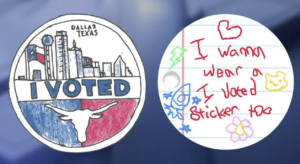 discovered, with her teacher’s help, the atomic symbol, resonating with Moab’s uranium era. “I stayed up until 2 a.m. making the final design on Clip Studio.” In Dallas County, Texas, the county partnered with MTTP Texas, a nonpartisan nonprofit, to hold a contest for a newly designed sticker. The contest asked for creative designs for an adult sticker and for children who come with voters.
discovered, with her teacher’s help, the atomic symbol, resonating with Moab’s uranium era. “I stayed up until 2 a.m. making the final design on Clip Studio.” In Dallas County, Texas, the county partnered with MTTP Texas, a nonpartisan nonprofit, to hold a contest for a newly designed sticker. The contest asked for creative designs for an adult sticker and for children who come with voters. 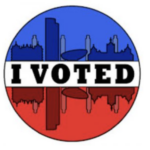 Mareily Lopez, a student at Samuell High School in Dallas ISD, won the adult sticker contest. Elizabeth Ojo, from Arlington ISD’s Sequin High School, was the “future voter” design winner to hand out to young children. “When I was creating this sticker, I was thinking about how when I was little, I would always go to the voting area with my mother. I would always be a little jealous that she would get a sticker, and I wouldn’t,” Elizabeth said. “So when I was designing this, I was just thinking about that, and I decided to put the idea down on paper… I wanted to capture a childlike essence, so I used my left hand to draw everything out.” Congratulations to Guilderland High School senior Tyler
Mareily Lopez, a student at Samuell High School in Dallas ISD, won the adult sticker contest. Elizabeth Ojo, from Arlington ISD’s Sequin High School, was the “future voter” design winner to hand out to young children. “When I was creating this sticker, I was thinking about how when I was little, I would always go to the voting area with my mother. I would always be a little jealous that she would get a sticker, and I wouldn’t,” Elizabeth said. “So when I was designing this, I was just thinking about that, and I decided to put the idea down on paper… I wanted to capture a childlike essence, so I used my left hand to draw everything out.” Congratulations to Guilderland High School senior Tyler 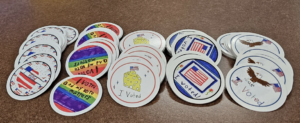 Pentak for creating the winning Albany County, New York “I Voted” sticker. “We just wanted to come up with a fun way to engage kids in the election process and make them more aware of it and engage them with art,” said Victoria Plotsky, Albany County Legislative District 38. Voters in Superior, Minnesota will get one of six new “I Voted” stickers at the polls in
Pentak for creating the winning Albany County, New York “I Voted” sticker. “We just wanted to come up with a fun way to engage kids in the election process and make them more aware of it and engage them with art,” said Victoria Plotsky, Albany County Legislative District 38. Voters in Superior, Minnesota will get one of six new “I Voted” stickers at the polls in  November. The city clerk’s office got about 60 entrants and narrowed that down to six. “It was hard to pick a winner because if you look at them, there are so many that are adorable and cute,” City Clerk Heidi Blunt said. “We really just had to settle on a small handful that we knew would print really well.” Voters in Oconee County, South Carolina will get to choose from nine different “I Voted” stickers during early voting and on Election Day. “There’s a lot of talent in this county,”
November. The city clerk’s office got about 60 entrants and narrowed that down to six. “It was hard to pick a winner because if you look at them, there are so many that are adorable and cute,” City Clerk Heidi Blunt said. “We really just had to settle on a small handful that we knew would print really well.” Voters in Oconee County, South Carolina will get to choose from nine different “I Voted” stickers during early voting and on Election Day. “There’s a lot of talent in this county,”  Oconee County elections board chairman Jim Murray said. Voters in Sunderland, Massachusetts will have a choice between stickers with an eagle, a boater on water or a raised hand with a sign that says “voting rocks” at the polls this year. The stickers are the result of the town’s first-ever election sticker contest, which formed out of a partnership between Town Clerk Wendy Houle and Sunderland Elementary School art teacher Issa Revell. Brookline, Massachusetts new “I Voted” sticker was designed by local artist Caroline Barnes, who creates Brookline-specific turkey art. Town Clerk
Oconee County elections board chairman Jim Murray said. Voters in Sunderland, Massachusetts will have a choice between stickers with an eagle, a boater on water or a raised hand with a sign that says “voting rocks” at the polls this year. The stickers are the result of the town’s first-ever election sticker contest, which formed out of a partnership between Town Clerk Wendy Houle and Sunderland Elementary School art teacher Issa Revell. Brookline, Massachusetts new “I Voted” sticker was designed by local artist Caroline Barnes, who creates Brookline-specific turkey art. Town Clerk 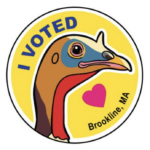 Ben Kaufman said poll workers and other election officials picked the sticker from several other designs. He assured voters that his office has more than enough stickers, both in the turkey
Ben Kaufman said poll workers and other election officials picked the sticker from several other designs. He assured voters that his office has more than enough stickers, both in the turkey 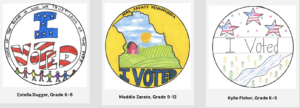 and traditional designs. The three winners of the York County, Pennsylvania “I Voted” sticker contest were announced this week. The idea behind this contest comes after President Commissioner of York County Julie Wheeler researched ways to increase voter turnout. More than 200 students in the area showed off their artistic designs. “These are wonderful representations of York County where you have some of our agricultural routes displayed in Madeline’s so it’s a really good cross-section of what our
and traditional designs. The three winners of the York County, Pennsylvania “I Voted” sticker contest were announced this week. The idea behind this contest comes after President Commissioner of York County Julie Wheeler researched ways to increase voter turnout. More than 200 students in the area showed off their artistic designs. “These are wonderful representations of York County where you have some of our agricultural routes displayed in Madeline’s so it’s a really good cross-section of what our  youngsters think about York County and the voting process,” said Wheeler. While we like to celebrate all the unique “I Voted” stickers here, we also love a good “I Voted” sticker story and AARP has one about the woman who designed the iconic American flag sticker that so many people receive. And last but not least, The Sphere in Las Vegas was recently spotted sporting an “I Voted” sticker. The sticker appeared on the first day of early voting in Nevada.
youngsters think about York County and the voting process,” said Wheeler. While we like to celebrate all the unique “I Voted” stickers here, we also love a good “I Voted” sticker story and AARP has one about the woman who designed the iconic American flag sticker that so many people receive. And last but not least, The Sphere in Las Vegas was recently spotted sporting an “I Voted” sticker. The sticker appeared on the first day of early voting in Nevada.
Personnel News: Craig Steingaard has resigned as the Burleigh County, North Dakota elections administrator.
New Research and Resources
 Language Access: The Center for Tech and Civic Life announced it is expanding the organization’s long standing nonpartisan ballot information to make it accessible to Spanish-speaking voters. The project brings together four other nonpartisan organizations to build fully translated Spanish ballot look up tools and integrate those tools into existing nonpartisan voter engagement programs. Voters can now look up their ballot information in both English and Spanish using Vote.org’s tool or Rock the Vote’s tool. CTCL has worked with a team of professional translators and proofreaders to translate the English dataset into Spanish, creating the first and only nationwide dataset of ballot information available in both English and Spanish. To connect voters with this information ahead of the 2024 general election, CTCL distributed grants to nonpartisan organizations that could build and promote online ballot lookup tools. This year’s grantees include Vote.org, Rock the Vote, Poder Latinx, and Mi Familia Vota. “Increasing language access is essential to ensuring that every eligible voter can participate in the electoral process,” said Armondo Salud, Deputy of Elections in Yolo County, California. “When voters have access to materials and assistance in their native language, it removes barriers that could otherwise prevent them from engaging. Ultimately, language access enhances the fairness and transparency of elections, ensuring that all voices in our community are heard.”
Language Access: The Center for Tech and Civic Life announced it is expanding the organization’s long standing nonpartisan ballot information to make it accessible to Spanish-speaking voters. The project brings together four other nonpartisan organizations to build fully translated Spanish ballot look up tools and integrate those tools into existing nonpartisan voter engagement programs. Voters can now look up their ballot information in both English and Spanish using Vote.org’s tool or Rock the Vote’s tool. CTCL has worked with a team of professional translators and proofreaders to translate the English dataset into Spanish, creating the first and only nationwide dataset of ballot information available in both English and Spanish. To connect voters with this information ahead of the 2024 general election, CTCL distributed grants to nonpartisan organizations that could build and promote online ballot lookup tools. This year’s grantees include Vote.org, Rock the Vote, Poder Latinx, and Mi Familia Vota. “Increasing language access is essential to ensuring that every eligible voter can participate in the electoral process,” said Armondo Salud, Deputy of Elections in Yolo County, California. “When voters have access to materials and assistance in their native language, it removes barriers that could otherwise prevent them from engaging. Ultimately, language access enhances the fairness and transparency of elections, ensuring that all voices in our community are heard.”
 Lowering Violence Risk: The Committee for Safe and Secure Elections (CSSE) launched a national PSA campaign. aiming to reduce the risk of violence against election officials, their families, and the electoral process. It features law enforcement personnel, election officials, and veterans—trusted voices representing a diverse array of American perspectives. All the videos — 3-minute, 0:30-second, and 0:15-second — can be found here. The leaders featured in the video include: Orange County, California Sheriff Don Barnes; Capt. Harold Love, Captain, Michigan State Police, Retired; Gen. Ronald Burgess, Lieutenant General, United States Army, Retired (former senior intelligence official); Gen. Marty France, Brigadier General, United States Air Force, Retired; Carly Koppes, County Clerk and Recorder, Weld County Colorado; and Wannicha (“Ike”) Rojanapradith, Director of Elections and General Registrar, City of Fairfax, Virginia
Lowering Violence Risk: The Committee for Safe and Secure Elections (CSSE) launched a national PSA campaign. aiming to reduce the risk of violence against election officials, their families, and the electoral process. It features law enforcement personnel, election officials, and veterans—trusted voices representing a diverse array of American perspectives. All the videos — 3-minute, 0:30-second, and 0:15-second — can be found here. The leaders featured in the video include: Orange County, California Sheriff Don Barnes; Capt. Harold Love, Captain, Michigan State Police, Retired; Gen. Ronald Burgess, Lieutenant General, United States Army, Retired (former senior intelligence official); Gen. Marty France, Brigadier General, United States Air Force, Retired; Carly Koppes, County Clerk and Recorder, Weld County Colorado; and Wannicha (“Ike”) Rojanapradith, Director of Elections and General Registrar, City of Fairfax, Virginia
 Check Your Ballot: With Election Day two weeks out and early voting underway, now is a good time to remind voters to check #checkyourballot before casting it! Verified Voting has created a #checkyourballot social media toolkit with sample graphics and copy (including white label). It’s a quick, easy thing that voters can do to ensure their voice is heard—double check that their paper ballot correctly reflects their choices before they turn it in. We hope you’ll find this toolkit useful and consider resharing Verified Voting’s #checkyourballot campaign posts. It helps for *all* voters to double check their paper ballots. In some states, voters use a machine to mark their ballots—this helpful #checkyourballot reminder makes sure voters check the printout (not just the screen) before they cast their votes (to find your jurisdiction’s equipment, visit this map). This is why we’ve also created graphics specifically for Georgia, Nevada, and Philadelphia County voters, which you’ll find in the same toolkit.
Check Your Ballot: With Election Day two weeks out and early voting underway, now is a good time to remind voters to check #checkyourballot before casting it! Verified Voting has created a #checkyourballot social media toolkit with sample graphics and copy (including white label). It’s a quick, easy thing that voters can do to ensure their voice is heard—double check that their paper ballot correctly reflects their choices before they turn it in. We hope you’ll find this toolkit useful and consider resharing Verified Voting’s #checkyourballot campaign posts. It helps for *all* voters to double check their paper ballots. In some states, voters use a machine to mark their ballots—this helpful #checkyourballot reminder makes sure voters check the printout (not just the screen) before they cast their votes (to find your jurisdiction’s equipment, visit this map). This is why we’ve also created graphics specifically for Georgia, Nevada, and Philadelphia County voters, which you’ll find in the same toolkit.
Ballot Measures, Legislation & Rulemaking
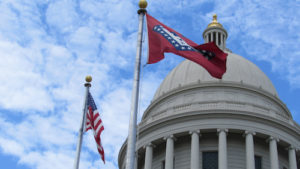 Arkansas: This week, the Joint Performance Review Committee agreed that state authorities should investigate potentially illegal alterations of petitions collected for a ballot measure proposing elections be conducted with hand-marked, hand-counted paper ballots. After questioning witnesses for three hours about redacted and changed addresses on signature collection sheets from Conway, Faulkner and Saline counties, the Committee voted to refer the matter to the Arkansas attorney general, the state ethics commission and a prosecuting attorney. State law requires canvassers for ballot measures to be residents of the state and to provide the address of their current residence on the pages in which they collect signatures. Eighteen canvassers from other states collected signatures for the Hand Marked, Hand Counted Paper Ballot Ordinance of 2024, and 14 blacked out their current residence addresses and substituted the address of the Home2 Suites hotel in Conway, according to documents provided to the Joint Performance Review Committee. County clerks in nine counties have faced recent lawsuits seeking to put the proposed measure on countywide ballots after they rejected the efforts.
Arkansas: This week, the Joint Performance Review Committee agreed that state authorities should investigate potentially illegal alterations of petitions collected for a ballot measure proposing elections be conducted with hand-marked, hand-counted paper ballots. After questioning witnesses for three hours about redacted and changed addresses on signature collection sheets from Conway, Faulkner and Saline counties, the Committee voted to refer the matter to the Arkansas attorney general, the state ethics commission and a prosecuting attorney. State law requires canvassers for ballot measures to be residents of the state and to provide the address of their current residence on the pages in which they collect signatures. Eighteen canvassers from other states collected signatures for the Hand Marked, Hand Counted Paper Ballot Ordinance of 2024, and 14 blacked out their current residence addresses and substituted the address of the Home2 Suites hotel in Conway, according to documents provided to the Joint Performance Review Committee. County clerks in nine counties have faced recent lawsuits seeking to put the proposed measure on countywide ballots after they rejected the efforts.
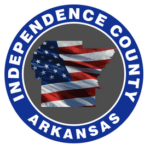 Independence County, Arkansas: The Hand Marked, Hand Counted Paper Ballot Ordinance would require all elections in Independence County to use paper ballots. The ordinance was petitioned by resident Bryan Norris. He said voting machines in Arkansas are susceptible to outside influence, namely the company that makes them since he says the public has no access to how the machines count those votes. “We are not allowed to know that source code, so we cannot say that there’s nefarious activity or there isn’t nefarious activity. We just don’t know, and we don’t think that that’s proper or fair, and we think Arkansans deserve better,” Norris said. The ordinance would also require workers to count votes and verify them by hand. Norris said the paper ballots would return integrity to the voting process. But not everyone is on the same page. County Attorney Daniel Haney said the change isn’t needed and voter integrity isn’t an issue in the county. “We have a Secretary of State who oversees elections, and we have quite a few individuals who have their hands in this. And again, if it was a problem, we’d be seeing our legislature take care of it,” Haney said. Haney said if the ordinance is passed, it could cause concerns from how it will adhere to state legislation to the time it will take for the ballots to be counted. It could also be a financial concern. “One is nobody sure really knows what the cost is,” Haney said. “If the county is supposed to appropriate funds to ensure that we have a hand count verification process. But we don’t know the cost. The county is now in trouble with possibly operating in the red, and nobody wants to do that.”
Independence County, Arkansas: The Hand Marked, Hand Counted Paper Ballot Ordinance would require all elections in Independence County to use paper ballots. The ordinance was petitioned by resident Bryan Norris. He said voting machines in Arkansas are susceptible to outside influence, namely the company that makes them since he says the public has no access to how the machines count those votes. “We are not allowed to know that source code, so we cannot say that there’s nefarious activity or there isn’t nefarious activity. We just don’t know, and we don’t think that that’s proper or fair, and we think Arkansans deserve better,” Norris said. The ordinance would also require workers to count votes and verify them by hand. Norris said the paper ballots would return integrity to the voting process. But not everyone is on the same page. County Attorney Daniel Haney said the change isn’t needed and voter integrity isn’t an issue in the county. “We have a Secretary of State who oversees elections, and we have quite a few individuals who have their hands in this. And again, if it was a problem, we’d be seeing our legislature take care of it,” Haney said. Haney said if the ordinance is passed, it could cause concerns from how it will adhere to state legislation to the time it will take for the ballots to be counted. It could also be a financial concern. “One is nobody sure really knows what the cost is,” Haney said. “If the county is supposed to appropriate funds to ensure that we have a hand count verification process. But we don’t know the cost. The county is now in trouble with possibly operating in the red, and nobody wants to do that.”
 Michigan: Clerks are speaking up about the Michigan Voting Rights Act, a package of four bills moving through the Legislature. The bills aim to prevent voter suppression, expand ballot access to more language communities, create a statewide voting data clearinghouse, and clarify protections for voters who need help casting their ballot.. Clerks told Votebeat they have a lot of concerns about the MVRA, though some are not prepared to think about about laws that wouldn’t come into play until next year at the soonest as they prepare for a general election that’s already underway. “I’m not really excited about this as it stands,” said Michael Siegrist, Canton Township clerk and second vice president of the Michigan Association of Municipal Clerks. He and other clerks say they’re nervous about the potential costs that would largely be passed on to municipalities as well as the proposed consequences for what could be simple human errors in the course of running an election. The state municipal clerks association is officially neutral on the package of bills, as is its county-level counterpart, the Michigan Association of County Clerks. Both groups had a hand in shaping the legislation, but say there’s still room for improvement.
Michigan: Clerks are speaking up about the Michigan Voting Rights Act, a package of four bills moving through the Legislature. The bills aim to prevent voter suppression, expand ballot access to more language communities, create a statewide voting data clearinghouse, and clarify protections for voters who need help casting their ballot.. Clerks told Votebeat they have a lot of concerns about the MVRA, though some are not prepared to think about about laws that wouldn’t come into play until next year at the soonest as they prepare for a general election that’s already underway. “I’m not really excited about this as it stands,” said Michael Siegrist, Canton Township clerk and second vice president of the Michigan Association of Municipal Clerks. He and other clerks say they’re nervous about the potential costs that would largely be passed on to municipalities as well as the proposed consequences for what could be simple human errors in the course of running an election. The state municipal clerks association is officially neutral on the package of bills, as is its county-level counterpart, the Michigan Association of County Clerks. Both groups had a hand in shaping the legislation, but say there’s still room for improvement.
 Luzerne County, Pennsylvania: The County Council approved an election safety resolution this week. Council voted 6-5 to approve the resolution proposed by council Vice Chairman Brian Thornton, which discourages the use of ballot drop boxes “because of safety and security concerns associated with them.” The resolution does not have the force of law and does not compel the county election board or administration to take any action. It does demonstrate that council supports the safety of voters, poll workers, election officials and the public, Thornton has said since the resolution appeared on the agenda for council’s Tuesday voting session. The resolution states that council is “dedicated to the democratic process of fair, free and secure elections,” and supports the right of election workers “to perform their duties free of harassment, intimidation and threats against their physical safety.”
Luzerne County, Pennsylvania: The County Council approved an election safety resolution this week. Council voted 6-5 to approve the resolution proposed by council Vice Chairman Brian Thornton, which discourages the use of ballot drop boxes “because of safety and security concerns associated with them.” The resolution does not have the force of law and does not compel the county election board or administration to take any action. It does demonstrate that council supports the safety of voters, poll workers, election officials and the public, Thornton has said since the resolution appeared on the agenda for council’s Tuesday voting session. The resolution states that council is “dedicated to the democratic process of fair, free and secure elections,” and supports the right of election workers “to perform their duties free of harassment, intimidation and threats against their physical safety.”
Litigation This Week
 Arizona: Cochise County Supervisor Peggy Judd who refused to certify the county’s 2022 midterm election on time has accepted a plea agreement. Judd was initially charged with two felony counts of conspiracy and interference with an elections officer, and had pleaded not guilty. On Monday, though, she pleaded guilty to a separate misdemeanor charge of failure or refusal to perform duty by an election officer and “acknowledged that she failed to canvass the election as required by law,” according to a news release from Attorney General Kris Mayes. Judd will be sentenced to at least 90 days’ unsupervised probation, and will pay a maximum $500 fine, according to the release. A copy of the plea agreement was not yet available Monday morning. “Any attempt to interfere with elections in Arizona will not be tolerated,” Mayes said in a statement announcing the plea deal. “Today’s plea agreement and sentencing should serve as a strong reminder that I will not hesitate to use every tool available to uphold the rule of law and protect the integrity of Arizona’s elections,” Mayes said.
Arizona: Cochise County Supervisor Peggy Judd who refused to certify the county’s 2022 midterm election on time has accepted a plea agreement. Judd was initially charged with two felony counts of conspiracy and interference with an elections officer, and had pleaded not guilty. On Monday, though, she pleaded guilty to a separate misdemeanor charge of failure or refusal to perform duty by an election officer and “acknowledged that she failed to canvass the election as required by law,” according to a news release from Attorney General Kris Mayes. Judd will be sentenced to at least 90 days’ unsupervised probation, and will pay a maximum $500 fine, according to the release. A copy of the plea agreement was not yet available Monday morning. “Any attempt to interfere with elections in Arizona will not be tolerated,” Mayes said in a statement announcing the plea deal. “Today’s plea agreement and sentencing should serve as a strong reminder that I will not hesitate to use every tool available to uphold the rule of law and protect the integrity of Arizona’s elections,” Mayes said.
Brian Ogstad, 60 of Cullman, Alabama was sentenced to 30 months in prison after pleading guilty to sending threats to a social media account managed by the Maricopa County Elections Department. The U.S. Department of Justice announced that a federal judge sentenced Ogstad to the two-and-a-half year prison stint along with three years of supervised release. Ogstad pleaded guilty to one count of making a threatening interstate communication on July 25, 2024. He will also have to pay a $1,000 fine. “In this election season we honor and respect those public servants who enable Americans to exercise their constitutional right to vote,” U.S. Attorney Gary Restaino said in a statement. “And we seek to protect all election workers from intimidation and harassment. Threats of violence, whether conveyed by words or deeds or pictures, will be met in this District with robust prosecution.”
 Arkansas: On October 17, the Arkansas Supreme Court ruled that early voting must occur at two West Memphis churches. The decision comes four days before early voting begins in Arkansas and after a few weeks of fast-paced legal filings and a ruling from Crittenden County Circuit Judge Chris Thyer, who ordered local election officials to conduct early voting at the Seventh Street Church of Christ in West Memphis — one of three contested sites. Attorney Joe Rogers appealed Thyer’s order on behalf of the members of the Crittenden County Board of Election Commissioners on Oct. 4. The commissioners, and later Attorney General Tim Griffin through an amicus brief, argued that County Clerk Paula Brown inappropriately designated the Seventh Street Church as an early polling site and called on the commissioners to staff it. Earlier in the day, the court granted Griffin permission to file his “friend-of-the-court” brief, despite an attempt to disallow it by the attorney for the plaintiffs in the original case. Hours later, in a decision authored by Justice Courtney Rae Hudson, the high court sided with Thyer’s ruling in that Brown appropriately designated the Seventh Street Church of Christ as an early voting location, but found Brown should conduct the voting, not the county election commissioners. The high court also reversed part of Thyer’s ruling, in which he said election commissioners were not required to conduct early voting at the First Baptist Church in West Memphis — which had been used as an early voting site in 2022 — because the commissioners did not establish it as a polling site this year. Hudson said sites outside of the county seat established by the county board of election commissioners.
Arkansas: On October 17, the Arkansas Supreme Court ruled that early voting must occur at two West Memphis churches. The decision comes four days before early voting begins in Arkansas and after a few weeks of fast-paced legal filings and a ruling from Crittenden County Circuit Judge Chris Thyer, who ordered local election officials to conduct early voting at the Seventh Street Church of Christ in West Memphis — one of three contested sites. Attorney Joe Rogers appealed Thyer’s order on behalf of the members of the Crittenden County Board of Election Commissioners on Oct. 4. The commissioners, and later Attorney General Tim Griffin through an amicus brief, argued that County Clerk Paula Brown inappropriately designated the Seventh Street Church as an early polling site and called on the commissioners to staff it. Earlier in the day, the court granted Griffin permission to file his “friend-of-the-court” brief, despite an attempt to disallow it by the attorney for the plaintiffs in the original case. Hours later, in a decision authored by Justice Courtney Rae Hudson, the high court sided with Thyer’s ruling in that Brown appropriately designated the Seventh Street Church of Christ as an early voting location, but found Brown should conduct the voting, not the county election commissioners. The high court also reversed part of Thyer’s ruling, in which he said election commissioners were not required to conduct early voting at the First Baptist Church in West Memphis — which had been used as an early voting site in 2022 — because the commissioners did not establish it as a polling site this year. Hudson said sites outside of the county seat established by the county board of election commissioners.
 Colorado: Teak Ty Brockbank, 45, of Cortez pleaded guilty to one count of transmitting interstate threats. According to the plea agreement, Brockbank made a series of online threats toward elections officials in Colorado and Arizona, a Colorado state judge, and federal law enforcement agents between September 2021 and July 2024. In the plea agreement, Brockbank also admitted that, during that time, he used two social media accounts to post messages threatening Colorado and Arizona election officials. Brockbank admitted to other threats as well. United States District Judge S. Kato Crews presided over the change of plea hearing. The FBI Denver Field Office investigated the case. Sentencing will be held on February 3, 2025.
Colorado: Teak Ty Brockbank, 45, of Cortez pleaded guilty to one count of transmitting interstate threats. According to the plea agreement, Brockbank made a series of online threats toward elections officials in Colorado and Arizona, a Colorado state judge, and federal law enforcement agents between September 2021 and July 2024. In the plea agreement, Brockbank also admitted that, during that time, he used two social media accounts to post messages threatening Colorado and Arizona election officials. Brockbank admitted to other threats as well. United States District Judge S. Kato Crews presided over the change of plea hearing. The FBI Denver Field Office investigated the case. Sentencing will be held on February 3, 2025.
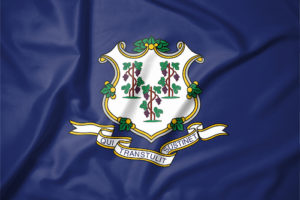 Connecticut: Superior Court Judge Tracy Lee Dayton granted state prosecutors more time to investigate the case against a city councilman and three city campaign workers facing absentee ballot fraud charges. As the four defendants and their lawyers stood before Dayton, Deputy Chief State’s Attorney Kevin Lawlor asked the judge to continue the case.“There is a further investigation and I am having ongoing discussion with counsel,” Lawlor told the judge. Lawlor later declined comment on what that investigation entails. The judge agreed to continue the case to Dec. 11. Wanda Geter-Pataky, 67, deputy head of the city’s Democratic Town Committee, City Councilman Alfredo Castillo, 52, and two workers on the 2019 mayoral campaigns, Nilsa Heredia, 61 a supporter of Mayor Joe Ganim’s re-election for mayor and Josephine Edmonds, 62 , a supporter for state Sen. Marilyn Moore, who primaried Ganim, are charged with multiple counts of election fraud in connection with absentee ballots for the 2019 mayoral primary.
Connecticut: Superior Court Judge Tracy Lee Dayton granted state prosecutors more time to investigate the case against a city councilman and three city campaign workers facing absentee ballot fraud charges. As the four defendants and their lawyers stood before Dayton, Deputy Chief State’s Attorney Kevin Lawlor asked the judge to continue the case.“There is a further investigation and I am having ongoing discussion with counsel,” Lawlor told the judge. Lawlor later declined comment on what that investigation entails. The judge agreed to continue the case to Dec. 11. Wanda Geter-Pataky, 67, deputy head of the city’s Democratic Town Committee, City Councilman Alfredo Castillo, 52, and two workers on the 2019 mayoral campaigns, Nilsa Heredia, 61 a supporter of Mayor Joe Ganim’s re-election for mayor and Josephine Edmonds, 62 , a supporter for state Sen. Marilyn Moore, who primaried Ganim, are charged with multiple counts of election fraud in connection with absentee ballots for the 2019 mayoral primary.
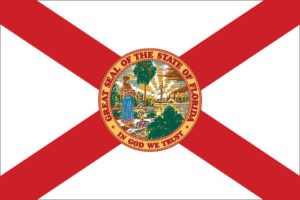 Florida: The Republican National Committee (RNC) and Republican Party of Florida (RPOF) have filed a motion to intervene in a lawsuit over a state law requiring that a voter’s name and Social Security number match the info on their government ID. Civil rights groups, collectively represented by nonprofit plaintiff Florida Rising Together, sued Secretary of State Cord Byrd, Attorney General Ashley Moody and Supervisors of Elections in Broward, Duval, Miami-Dade and Orange counties last month. In their suit, they alleged that more than 43,000 people in Florida have been denied their right to vote since 2018 because the identifying information they used to register was not an exact match for information on a state or federal database. But according to the RNC and RPOF’s motion, upending the rule “will result in more ineligible voters being added to and remaining on Florida’s voter rolls, which impairs … accurate registration lists.” “The voter registration matching law is a commonsense election safeguard that protects against fraud,” RNC Chair Michael Whatley said in a statement.
Florida: The Republican National Committee (RNC) and Republican Party of Florida (RPOF) have filed a motion to intervene in a lawsuit over a state law requiring that a voter’s name and Social Security number match the info on their government ID. Civil rights groups, collectively represented by nonprofit plaintiff Florida Rising Together, sued Secretary of State Cord Byrd, Attorney General Ashley Moody and Supervisors of Elections in Broward, Duval, Miami-Dade and Orange counties last month. In their suit, they alleged that more than 43,000 people in Florida have been denied their right to vote since 2018 because the identifying information they used to register was not an exact match for information on a state or federal database. But according to the RNC and RPOF’s motion, upending the rule “will result in more ineligible voters being added to and remaining on Florida’s voter rolls, which impairs … accurate registration lists.” “The voter registration matching law is a commonsense election safeguard that protects against fraud,” RNC Chair Michael Whatley said in a statement.
 Georgia: The Georgia Supreme Court declined the Republican National Committee’s request to pause a trial court’s decision to block new Georgia State Election Board rules from taking effect for the Nov. 5 general election. The state Supreme Court issued the order rejecting the emergency motion filed by the Georgia Republican Party and Republican National Committee requesting that the court fast-track the reinstatement of several State Election Board requirements that were ruled to be illegal and unconstitutional by a lower court judge last week. Fulton County Superior Court Judge Thomas A. Cox Jr. issued a ruling last week invalidating new statewide procedures for hand counting paper ballots, poll watcher access and other election rules that were pushed through by three right-wing state election officials. The Republican National Committee filed an emergency appeal directly with the Georgia Supreme Court last week to expedite the appellate process in order to have the rules enforced for the Nov. 5 election. Typically, the Georgia Court of Appeals is a necessary interim step before superior court rulings are considered by the state’s high court. Concurring in the unanimous state Supreme Court decision were a combined eight appointees of Republican Georgia governors Brian Kemp and his predecessor Nathan Deal. Justice John J. Ellington was first elected in 2018 in a nonpartisan statewide election.
Georgia: The Georgia Supreme Court declined the Republican National Committee’s request to pause a trial court’s decision to block new Georgia State Election Board rules from taking effect for the Nov. 5 general election. The state Supreme Court issued the order rejecting the emergency motion filed by the Georgia Republican Party and Republican National Committee requesting that the court fast-track the reinstatement of several State Election Board requirements that were ruled to be illegal and unconstitutional by a lower court judge last week. Fulton County Superior Court Judge Thomas A. Cox Jr. issued a ruling last week invalidating new statewide procedures for hand counting paper ballots, poll watcher access and other election rules that were pushed through by three right-wing state election officials. The Republican National Committee filed an emergency appeal directly with the Georgia Supreme Court last week to expedite the appellate process in order to have the rules enforced for the Nov. 5 election. Typically, the Georgia Court of Appeals is a necessary interim step before superior court rulings are considered by the state’s high court. Concurring in the unanimous state Supreme Court decision were a combined eight appointees of Republican Georgia governors Brian Kemp and his predecessor Nathan Deal. Justice John J. Ellington was first elected in 2018 in a nonpartisan statewide election.
National and state Republicans appealed a judge’s ruling that said seven election rules recently passed by Georgia’s State Election Board are “illegal, unconstitutional and void.” The Republican National Committee and the Georgia Republican Party are appealing a ruling from Fulton County Superior Court Judge Thomas Cox, who ruled Wednesday that the State Election Board did not have the authority to pass the rules and ordered it to immediately inform all state and local election officials that the rules are void and not to be followed. The rules that Cox invalidated include three that had gotten a lot of attention — one that requires that the number of ballots be hand-counted after the close of polls and two that had to do with the certification of election results. In a statement announcing the appeal. RNC Chairman Michael Whatley accused Cox of “the very worst of judicial activism.” “By overturning the Georgia State Election Board’s commonsense rules passed to safeguard Georgia’s elections, the judge sided with the Democrats in their attacks on transparency, accountability, and the integrity of our elections,” Whatley said. “We have immediately appealed this egregious order to ensure commonsense rules are in place for the election — we will not let this stand.” Alex Kaufman, a lawyer for the state Republican Party, said that the party filed an emergency notice of appeal with the Georgia Supreme Court.
A man was recently arrested and charged with disorderly conduct after allegedly yelling outside of a polling center in Evans. While working the early voting polling center on Ronald Reagan Drive on October 15, a Columbia County Sheriff’s Office deputy noted a man was reading [Bible] verses “loudly” and singing hymns for hours, according to an incident report. Unprovoked, the man “began yelling ‘Trump is a murderer and Kamala is a murderer! Who are you going to vote for now,'” according to the report. The deputy immediately approached the man in an attempt to discuss acceptable behavior at a voting precinct, but the man kept talking over him, according to the report. The man was escorted to the 150-foot line from the precinct and the deputy explained he was violating the campaigning distance. The man continued to “preach” from a distance, but later started walking back across the road toward voters who were standing in line, yelling and being disruptive again, according to the report. The deputy intercepted him before he made it back to the precinct and arrested him.
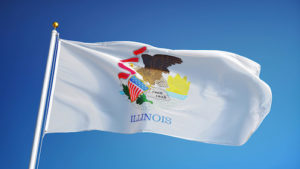 Illinois: DuPage County Clerk Jean Kaczmarek is suing the DuPage County Board, Auditor Bill White and county board Chair Deborah Conroy in a move to assert her right to control how she runs the clerk’s office. The lawsuit was filed earlier this month in response to a lawsuit filed in September by DuPage County State’s Attorney Robert Berlin, who is seeking a judge’s order to compel Kaczmarek to comply with county regulations regarding the payment of bills. In her countersuit, attorneys for Kaczmarek note that the Illinois attorney general’s office has issued “multiple opinions” regarding the clerk’s authority to manage internal operations of her office. They also highlight opinions from the state’s attorney general that the county board’s budgetary authority is limited to the appropriation of lump sums for three categories of expenses — equipment, material and services — and does not allow for line-item limitations. “This lawsuit repeats the same points of law my office has been raising for over two years,” Kaczmarek said in a press release. “Despite plain and unambiguous language backing us up, the state’s attorney chooses to ignore it.”
Illinois: DuPage County Clerk Jean Kaczmarek is suing the DuPage County Board, Auditor Bill White and county board Chair Deborah Conroy in a move to assert her right to control how she runs the clerk’s office. The lawsuit was filed earlier this month in response to a lawsuit filed in September by DuPage County State’s Attorney Robert Berlin, who is seeking a judge’s order to compel Kaczmarek to comply with county regulations regarding the payment of bills. In her countersuit, attorneys for Kaczmarek note that the Illinois attorney general’s office has issued “multiple opinions” regarding the clerk’s authority to manage internal operations of her office. They also highlight opinions from the state’s attorney general that the county board’s budgetary authority is limited to the appropriation of lump sums for three categories of expenses — equipment, material and services — and does not allow for line-item limitations. “This lawsuit repeats the same points of law my office has been raising for over two years,” Kaczmarek said in a press release. “Despite plain and unambiguous language backing us up, the state’s attorney chooses to ignore it.”
 Michigan: Michigan Court of Claims Judge Sima Patel rejected a Republican challenge to the eligibility of a small number of military and overseas voters to register for the Nov. 5 presidential election. Patel said in a written opinion that the Oct. 8 lawsuit was filed too close to Election Day. While that alone would bar the lawsuit, the election practices the GOP are challenging are “consistent with federal and state law, and the Michigan Constitution,” the judge said. The Michigan GOP, the Republican National Committee, and Chesterfield Township Clerk Cindy Berry sued Michigan Secretary of State Jocelyn Benson and her elections director, alleging they are unlawfully allowing voting by overseas residents who have never been Michigan residents. Though numbers are not available from state officials, the concern mainly relates to a small number of voting-age children and spouses of overseas residents. The Federal Uniformed and Overseas Citizens Absentee Voting Act supersedes state law in allowing citizens who are not currently residents of the state to vote. But the lawsuit argued that the federal law does not eliminate residency requirements entirely, and allowing voting in Michigan elections by those who have never lived in Michigan violates the state constitution. The suit argued this is especially harmful to Republican candidates, since overseas voters skew Democratic.
Michigan: Michigan Court of Claims Judge Sima Patel rejected a Republican challenge to the eligibility of a small number of military and overseas voters to register for the Nov. 5 presidential election. Patel said in a written opinion that the Oct. 8 lawsuit was filed too close to Election Day. While that alone would bar the lawsuit, the election practices the GOP are challenging are “consistent with federal and state law, and the Michigan Constitution,” the judge said. The Michigan GOP, the Republican National Committee, and Chesterfield Township Clerk Cindy Berry sued Michigan Secretary of State Jocelyn Benson and her elections director, alleging they are unlawfully allowing voting by overseas residents who have never been Michigan residents. Though numbers are not available from state officials, the concern mainly relates to a small number of voting-age children and spouses of overseas residents. The Federal Uniformed and Overseas Citizens Absentee Voting Act supersedes state law in allowing citizens who are not currently residents of the state to vote. But the lawsuit argued that the federal law does not eliminate residency requirements entirely, and allowing voting in Michigan elections by those who have never lived in Michigan violates the state constitution. The suit argued this is especially harmful to Republican candidates, since overseas voters skew Democratic.
Stacey Kramer, 56, of St. Clair Shores, was ordered to stand trial on one count each of voting absentee and in-person, punishable by up to five years in prison, and offering to vote more than once, punishable by up to four years in prison. “Although cases of double voting are extremely rare, my office remains committed to prosecuting voter fraud,” said Michigan Attorney General Dana Nessel in a statement. “Through the preliminary examination process, our prosecutors were able to exhibit sufficient evidence of the alleged offenses to advance this case toward a trial, and we are pleased to see this case proceed through the judicial process.” Kramer allegedly appeared at her local polling place in St. Clair Shores on Aug. 6 despite having already returned an absentee ballot for the same election, Nessel’s office said. Both votes were counted.
 Nevada: Judge Cristina Silva has dismissed a Republican-led lawsuit that accused Nevada officials of improperly maintaining the state’s voter rolls, adding to the litany of GOP defeats in court this cycle. In a ruling issued October 19, Silva determined that the Republican National Committee (RNC) and Nevada Republican Party had again failed to establish standing while arguing that high voter registration rates in five Nevada counties had harmed their overall mission and campaign activities. She will, however, allow the GOP to file an amended lawsuit, as she did in her June dismissal of the first iteration of the lawsuit. The lawsuit is the latest legal defeat for the RNC and Nevada GOP, which have filed a slew of lawsuits in Nevada this year related to voter rolls and mail ballot procedures. Republicans have not succeeded in any of their Nevada lawsuits this year, but some of the cases are in various stages of appeal. In a statement, an RNC spokesperson said the group plans to amend the lawsuit.
Nevada: Judge Cristina Silva has dismissed a Republican-led lawsuit that accused Nevada officials of improperly maintaining the state’s voter rolls, adding to the litany of GOP defeats in court this cycle. In a ruling issued October 19, Silva determined that the Republican National Committee (RNC) and Nevada Republican Party had again failed to establish standing while arguing that high voter registration rates in five Nevada counties had harmed their overall mission and campaign activities. She will, however, allow the GOP to file an amended lawsuit, as she did in her June dismissal of the first iteration of the lawsuit. The lawsuit is the latest legal defeat for the RNC and Nevada GOP, which have filed a slew of lawsuits in Nevada this year related to voter rolls and mail ballot procedures. Republicans have not succeeded in any of their Nevada lawsuits this year, but some of the cases are in various stages of appeal. In a statement, an RNC spokesperson said the group plans to amend the lawsuit.
 North Carolina: U.S. District Court Judge Richard E. Myers II dismissed part of the Republican National Committee’s (RNC) legal bid to remove up to 225,000 North Carolinians from the state’s voter rolls based on allegations of faulty voter registrations. Meyers dismissed the GOP plaintiffs’ claim under a federal law known as the Help America Vote Act (HAVA), but sent a separate state constitutional claim back down to a North Carolina court. The order noted that the case will return to state court on Oct. 22 barring an appeal of today’s ruling by the RNC and North Carolina GOP. In an Aug. 23 complaint, the RNC and state Republican Party alleged the North Carolina State Board of Elections (NCSBE) unlawfully registered large sums of “ineligible” voters — “including possible non-citizens” — prior to December 2023 using a form that failed to collect necessary identification information. The RNC originally filed its complaint in state court, the case ended up before a federal court after the NCSBE sought to move the legal proceedings to the U.S. District Court for the Eastern District of North Carolina. Per last week’s decision, the case will return to a state court for consideration of the plaintiffs’ remaining claim brought under a clause of the North Carolina Constitution that guarantees the fundamental right to vote.
North Carolina: U.S. District Court Judge Richard E. Myers II dismissed part of the Republican National Committee’s (RNC) legal bid to remove up to 225,000 North Carolinians from the state’s voter rolls based on allegations of faulty voter registrations. Meyers dismissed the GOP plaintiffs’ claim under a federal law known as the Help America Vote Act (HAVA), but sent a separate state constitutional claim back down to a North Carolina court. The order noted that the case will return to state court on Oct. 22 barring an appeal of today’s ruling by the RNC and North Carolina GOP. In an Aug. 23 complaint, the RNC and state Republican Party alleged the North Carolina State Board of Elections (NCSBE) unlawfully registered large sums of “ineligible” voters — “including possible non-citizens” — prior to December 2023 using a form that failed to collect necessary identification information. The RNC originally filed its complaint in state court, the case ended up before a federal court after the NCSBE sought to move the legal proceedings to the U.S. District Court for the Eastern District of North Carolina. Per last week’s decision, the case will return to a state court for consideration of the plaintiffs’ remaining claim brought under a clause of the North Carolina Constitution that guarantees the fundamental right to vote.
Superior Court Judge John Smith denied the Republican National Committee’s request to disenfranchise certain military and overseas voters. The state court rejected the RNC’s bid for a preliminary injunction, court records show. This means that individuals born overseas to parents or guardians who were last North Carolina residents will be allowed to vote in the November election. Smith determined that the RNC failed to present substantial evidence “of any instance where the harm that plaintiffs seek to prevent has ever ‘fraudulently’ occurred,” the decision said. “…This court should not be invoked to treat an entire group of citizens differently based upon unsupported and speculative allegations for which there is not even a scintilla of substantive evidence.” The RNC and its co-plaintiffs appealed the denial of their motion for a preliminary injunction to the North Carolina Court of Appeals.
 Oklahoma: U.S. Magistrate Judge Suzanne Mitchell ordered Nasir Ahmad Tawhedi, 27, of Oklahoma City to remain in custody as officials disclosed that he had previously worked as a security guard for an American military installation in Afghanistan. Mitchell issued her ruling after hearing testimony from an FBI special agent that Nasir Ahmad Tawhedi, 27, of Oklahoma City, and his brother-in-law, a juvenile, took steps to obtain AK-47 rifles and ammunition and planned to carry out an attack targeting large crowds on Election Day next month. Mitchell also determined there was probable cause to bind Tawhedi over for trial. FBI agent Derek Wiley testified that Tawhedi also is linked to an investigation in France that led to the arrests this month of three people, including two of Tawhedi’s brothers, who authorities say were plotting a terrorist attack in that country. One of those arrested in France, a 22-year-old Afghan who had residency papers in France, was being investigated for a suspected plan to attack people in a soccer stadium or shopping center.
Oklahoma: U.S. Magistrate Judge Suzanne Mitchell ordered Nasir Ahmad Tawhedi, 27, of Oklahoma City to remain in custody as officials disclosed that he had previously worked as a security guard for an American military installation in Afghanistan. Mitchell issued her ruling after hearing testimony from an FBI special agent that Nasir Ahmad Tawhedi, 27, of Oklahoma City, and his brother-in-law, a juvenile, took steps to obtain AK-47 rifles and ammunition and planned to carry out an attack targeting large crowds on Election Day next month. Mitchell also determined there was probable cause to bind Tawhedi over for trial. FBI agent Derek Wiley testified that Tawhedi also is linked to an investigation in France that led to the arrests this month of three people, including two of Tawhedi’s brothers, who authorities say were plotting a terrorist attack in that country. One of those arrested in France, a 22-year-old Afghan who had residency papers in France, was being investigated for a suspected plan to attack people in a soccer stadium or shopping center.
 Pennsylvania: In a 4-3 decision the Pennsylvania Supreme Court ruled that Pennsylvanians must be given a chance to vote on Election Day if their mail ballots have been rejected because of a disqualifying mistake. That means voters who fail to correctly sign or date the return envelope or fail to use a secrecy envelope are entitled to cast a provisional ballot on Election Day at a polling place and have it counted, as long as that ballot wouldn’t be rejected for some other disqualifying issue. The court said that provisional voting was meant to assure access to the right to vote, while simultaneously preventing double voting. Justice Christine Donohue, writing for the majority, noted that the Republican litigants argued that in order to maintain election integrity, provisional ballots should not be counted, but said the majority was “at a loss to identify what honest voting principle is violated by recognizing the validity of one ballot cast by one voter.” “If appellants presume that the general assembly intended to disqualify the provisional ballot of a voter who failed to effectively vote by mail in order to punish that voter, we caution that such a construction is not reconcilable with the right of franchise,” she wrote.
Pennsylvania: In a 4-3 decision the Pennsylvania Supreme Court ruled that Pennsylvanians must be given a chance to vote on Election Day if their mail ballots have been rejected because of a disqualifying mistake. That means voters who fail to correctly sign or date the return envelope or fail to use a secrecy envelope are entitled to cast a provisional ballot on Election Day at a polling place and have it counted, as long as that ballot wouldn’t be rejected for some other disqualifying issue. The court said that provisional voting was meant to assure access to the right to vote, while simultaneously preventing double voting. Justice Christine Donohue, writing for the majority, noted that the Republican litigants argued that in order to maintain election integrity, provisional ballots should not be counted, but said the majority was “at a loss to identify what honest voting principle is violated by recognizing the validity of one ballot cast by one voter.” “If appellants presume that the general assembly intended to disqualify the provisional ballot of a voter who failed to effectively vote by mail in order to punish that voter, we caution that such a construction is not reconcilable with the right of franchise,” she wrote.
Richard Lack, 63, has been charged for attempting to secure a mail-in ballot for his dead mother, Indiana County District Attorney Robert Manzi announced. The Indiana County Voter’s Registration Office received an application for a mail-in ballot for a woman with an address on Nibert Road. The application was flagged by the office staff and an investigation was opened. According to the DA’s office, Lack completed the application in order to get a mail-in ballot for his dead mother. Lack is accused of using his own phone number, e-mail address and other information directly related to him and forging his mother’s signature on the application. Lack has been a registered voter in Indiana County previously but is currently registered to vote in New Jersey. Lack is charged with violations of provisions relating to absentee and mail-in ballots, a misdemeanor of the third degree, forgery, a misdemeanor of the first degree and unsworn falsification, a misdemeanor of the second degree.
John Pollard, 62, of Philadelphia was indicted this week on charges he threatened a state party official who was recruiting poll watchers by texting he would “skin you alive” and kill the person, the Justice Department announced. Because he used Apple’s iMessage platform, Pollard was charged federally with transmitting interstate threats, which carries a maximum penalty of five years in prison. Pollard’s alleged victim, an employee of a state political party who lives in western Pennsylvania, wasn’t named in court records. But Pollard allegedly sent threatening text messages to the person on Sept. 6 at about 10 p.m. because the person was recruiting volunteers to serve as poll observers on Election Day. Neither Pollard’s party affiliation nor the victim’s was mentioned in his court records. Pollard was indicted Oct. 16 and the charges were unsealed Monday after his arrest. He has not yet made a formal court appearance and his lawyer was not listed in court records. The case is part of a federal Election Threats Task Force, which features federal, state and local authorities cooperating to enforce laws against threatening election workers.
 South Carolina: The state branch of the American Civil Liberties Union is suing to add potentially thousands of young South Carolina residents to the voter roll two weeks before the election. The ACLU filed a lawsuit October 22 alleging that the state Department of Motor Vehicles’ system made it impossible for some 17,000 eligible teenagers to register to vote while obtaining a driver’s license or other identification. The lawsuit also names the State Election Commission. Voter registration has been closed for a week already. But Paul Bowers, an ACLU spokesperson, said the organization did not hear about the issue until Oct. 12, when a social media post by state Rep. Spencer Wetmore, D-Folly Beach, brought it to the group’s attention. The 17-year-old son of a friend, Wetmore said, thought he’d registered to vote while applying for a driver’s license at the DMV. State law allows teenagers who will turn 18 by Election Day to register to vote up to 13 months in advance. Normally citizens can check a box saying “yes, I wish to register to vote” at the DMV and be added to the voter roll with almost no additional steps. But the state DMV system was programmed to ignore requests from teens who were not already 18 when they attempted to register, even if they would turn 18 by Election Day, according to the lawsuit. The system did not necessarily notify these teenagers that their attempt to register was unsuccessful, according to the lawsuit. Over the past week, the ACLU worked with the SCDMV to identify 17,564 people who fell into this category over the last 13 months. The ACLU then checked with the State Election Commission and found that 6,240 of these teenagers had registered successfully to vote some other way, leaving over 10,000 potentially unregistered. “I had no idea it was going to snowball into this,” Wetmore told the SC Daily Gazette. “I just didn’t have any concept it would be so many kids.” The lawsuit, filed in Richland County, includes a request for an emergency order for the DMV to identify any 17-year-olds who checked the box to register to vote but were not processed, and add them to the voter roll.
South Carolina: The state branch of the American Civil Liberties Union is suing to add potentially thousands of young South Carolina residents to the voter roll two weeks before the election. The ACLU filed a lawsuit October 22 alleging that the state Department of Motor Vehicles’ system made it impossible for some 17,000 eligible teenagers to register to vote while obtaining a driver’s license or other identification. The lawsuit also names the State Election Commission. Voter registration has been closed for a week already. But Paul Bowers, an ACLU spokesperson, said the organization did not hear about the issue until Oct. 12, when a social media post by state Rep. Spencer Wetmore, D-Folly Beach, brought it to the group’s attention. The 17-year-old son of a friend, Wetmore said, thought he’d registered to vote while applying for a driver’s license at the DMV. State law allows teenagers who will turn 18 by Election Day to register to vote up to 13 months in advance. Normally citizens can check a box saying “yes, I wish to register to vote” at the DMV and be added to the voter roll with almost no additional steps. But the state DMV system was programmed to ignore requests from teens who were not already 18 when they attempted to register, even if they would turn 18 by Election Day, according to the lawsuit. The system did not necessarily notify these teenagers that their attempt to register was unsuccessful, according to the lawsuit. Over the past week, the ACLU worked with the SCDMV to identify 17,564 people who fell into this category over the last 13 months. The ACLU then checked with the State Election Commission and found that 6,240 of these teenagers had registered successfully to vote some other way, leaving over 10,000 potentially unregistered. “I had no idea it was going to snowball into this,” Wetmore told the SC Daily Gazette. “I just didn’t have any concept it would be so many kids.” The lawsuit, filed in Richland County, includes a request for an emergency order for the DMV to identify any 17-year-olds who checked the box to register to vote but were not processed, and add them to the voter roll.
 Texas: Texas Attorney General Ken Paxton filed a lawsuit against the Department of Homeland Security October 22, claiming the Biden administration is unlawfully withholding information on the citizenship status of registered voters. In a complaint filed in the U.S. District Court for the Western District of Texas, Paxton, joined by the Texas Secretary of State, claims U.S. Citizenship and Immigration Services did not adequately comply with the attorney general’s request to verify the citizenship status of Texans who have registered to vote without a state-issued driver’s license or identification card. There are over 450,000 such voters registered in Texas, Paxton says in the complaint. He is asking the court to issue a writ of mandamus ordering the defendants to provide information on their citizenship. In his complaint, Paxton bemoans Congress’ failure to pass the SAVE Act, saying: “Texans are increasingly concerned about the possibility of non-citizen voting, and the Attorney General of Texas and the Secretary of State of Texas have the responsibility to uphold the integrity of Texas’s elections.”
Texas: Texas Attorney General Ken Paxton filed a lawsuit against the Department of Homeland Security October 22, claiming the Biden administration is unlawfully withholding information on the citizenship status of registered voters. In a complaint filed in the U.S. District Court for the Western District of Texas, Paxton, joined by the Texas Secretary of State, claims U.S. Citizenship and Immigration Services did not adequately comply with the attorney general’s request to verify the citizenship status of Texans who have registered to vote without a state-issued driver’s license or identification card. There are over 450,000 such voters registered in Texas, Paxton says in the complaint. He is asking the court to issue a writ of mandamus ordering the defendants to provide information on their citizenship. In his complaint, Paxton bemoans Congress’ failure to pass the SAVE Act, saying: “Texans are increasingly concerned about the possibility of non-citizen voting, and the Attorney General of Texas and the Secretary of State of Texas have the responsibility to uphold the integrity of Texas’s elections.”
 U.S. Virgin Islands: Supervisor of Elections Caroline Fawkes has officially filed suit against the V.I. Board of Elections, challenging its decision to reinstate disqualified candidate Ida Smith on the ballot for delegate to the U.S. House of Representatives. The legal action not only questions the board’s authority but also highlights a longstanding issue in the territory: the lack of clarity around residency terms like “inhabitant” and “resident.” Fawkes’ lawsuit, filed on Oct. 17 in the Superior Court of the Virgin Islands, seeks a temporary restraining order and an injunction to block Smith’s inclusion on the ballot. According to Fawkes, Smith was disqualified in June for failing to meet residency requirements, specifically for not submitting a tax return transcript by the June 10 deadline. Fawkes cited 18 V.I.C. §411, which grants the supervisor of Elections sole authority to determine a candidate’s qualifications. She argued that Smith’s failure to provide the necessary documentation was sufficient to remove her from the race. Despite this, the Board of Elections, led by members Raymond J. Williams and Epiphane Joseph, voted on Sept. 4 to reinstate Smith, reversing Fawkes’ decision. In her lawsuit, Fawkes contends that this move was beyond the board’s legal authority, as determining whether a candidate meets the legal requirements falls solely under the supervisor of Elections’ jurisdiction. Fawkes is asking the court to declare the board’s actions illegal and reaffirm the power of her office in deciding candidate eligibility.
U.S. Virgin Islands: Supervisor of Elections Caroline Fawkes has officially filed suit against the V.I. Board of Elections, challenging its decision to reinstate disqualified candidate Ida Smith on the ballot for delegate to the U.S. House of Representatives. The legal action not only questions the board’s authority but also highlights a longstanding issue in the territory: the lack of clarity around residency terms like “inhabitant” and “resident.” Fawkes’ lawsuit, filed on Oct. 17 in the Superior Court of the Virgin Islands, seeks a temporary restraining order and an injunction to block Smith’s inclusion on the ballot. According to Fawkes, Smith was disqualified in June for failing to meet residency requirements, specifically for not submitting a tax return transcript by the June 10 deadline. Fawkes cited 18 V.I.C. §411, which grants the supervisor of Elections sole authority to determine a candidate’s qualifications. She argued that Smith’s failure to provide the necessary documentation was sufficient to remove her from the race. Despite this, the Board of Elections, led by members Raymond J. Williams and Epiphane Joseph, voted on Sept. 4 to reinstate Smith, reversing Fawkes’ decision. In her lawsuit, Fawkes contends that this move was beyond the board’s legal authority, as determining whether a candidate meets the legal requirements falls solely under the supervisor of Elections’ jurisdiction. Fawkes is asking the court to declare the board’s actions illegal and reaffirm the power of her office in deciding candidate eligibility.
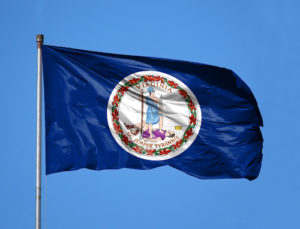 Virginia: Five Waynesboro voters have filed a lawsuit to prevent the majority of the Waynesboro Board of Elections from following through on their controversial pledge to refuse certification of the November 2024 election results, a move they argue would violate Virginia state law. The lawsuit, filed in Waynesboro Circuit Court on Oct. 21, comes after two GOP officials from Waynesboro filed their own lawsuit challenging Virginia’s voting system ahead of the Nov. 5 presidential election while threatening to not certify the results. In their complaint, Curtis Lilly, the chairman of the Waynesboro Electoral Board, and Scott Mares, the board’s vice chair, expressed their concerns over the reliability of electronic voting systems, which they argue are prone to inaccuracies. Instead, they demanded that all ballots be counted by hand. In their counter-suit, the five Waynesboro voters ask the court to require the election officials to certify the election results unless they prevail in their own suit. The plaintiffs further argue that the election officials’ stance violates the Virginia Constitution, which mandates that election results be certified in accordance with established procedures, including the use of legally authorized voting equipment.
Virginia: Five Waynesboro voters have filed a lawsuit to prevent the majority of the Waynesboro Board of Elections from following through on their controversial pledge to refuse certification of the November 2024 election results, a move they argue would violate Virginia state law. The lawsuit, filed in Waynesboro Circuit Court on Oct. 21, comes after two GOP officials from Waynesboro filed their own lawsuit challenging Virginia’s voting system ahead of the Nov. 5 presidential election while threatening to not certify the results. In their complaint, Curtis Lilly, the chairman of the Waynesboro Electoral Board, and Scott Mares, the board’s vice chair, expressed their concerns over the reliability of electronic voting systems, which they argue are prone to inaccuracies. Instead, they demanded that all ballots be counted by hand. In their counter-suit, the five Waynesboro voters ask the court to require the election officials to certify the election results unless they prevail in their own suit. The plaintiffs further argue that the election officials’ stance violates the Virginia Constitution, which mandates that election results be certified in accordance with established procedures, including the use of legally authorized voting equipment.
Michele White, the former Prince William County general registrar sued Virginia Attorney General Jason Miyares claiming the Republican prosecuted her in order to appease election deniers. White says her reputation as a dedicated election official was tarnished in 2022 when Miyares prosecuted her for election fraud relating to the 2020 election. The commonwealth dropped the charges in 2023. “As an election official, I worked every day for nearly twenty years to ensure that Virginia elections ran smoothly and according to law,” White said in a press release. “None of that mattered to the defendants, who showed no interest in the truth. Instead, they treated my career and well-being as collateral damage in their effort to promote false claims of widespread election fraud.” White says Miyares used her prosecution to legitimize the launch of the state’s election integrity unit, a group of 20 lawyers, many of whom lack election backgrounds, to investigate election fraud. Since its founding, two days after White’s 2022 indictment, White is the only official to have been charged.
 Wisconsin: The Public Interest Legal Foundation is suing the Wisconsin Elections Commission for records tied to guidance the firm claims doesn’t state law on verifying addresses of people who register to vote on Election Day. In the lawsuit, filed October 17 in Dane County Circuit Court, the organization claims the commission has withheld communications between the commission, clerks and district attorneys for more than a year. The guidance at the heart of the lawsuit advises clerks on what to do if “Election Day Registration” or EDR postcards are returned to their offices and marked undeliverable. The postcards are used to verify the address a voter gives at the polls when registering the day of an election. Public Interest Legal Foundation President J. Christian Adams said Wisconsin law is clear that if an EDR postcard is returned to a clerk, they’re supposed to suspend that person’s voter registration and refer them to the local district attorney for potential criminal charges. He claims the commission’s guidance “advised clerks not to follow that law.” “We just want to get a better understanding of why Wisconsin Elections Commission officials would have been doing that,” Adams said. “And so, we asked for the records, they didn’t turn them over, and a lot of time has gone by.” A spokesperson for the Wisconsin Elections Commission didn’t immediately respond to a request for comment on the guidance and lawsuit.
Wisconsin: The Public Interest Legal Foundation is suing the Wisconsin Elections Commission for records tied to guidance the firm claims doesn’t state law on verifying addresses of people who register to vote on Election Day. In the lawsuit, filed October 17 in Dane County Circuit Court, the organization claims the commission has withheld communications between the commission, clerks and district attorneys for more than a year. The guidance at the heart of the lawsuit advises clerks on what to do if “Election Day Registration” or EDR postcards are returned to their offices and marked undeliverable. The postcards are used to verify the address a voter gives at the polls when registering the day of an election. Public Interest Legal Foundation President J. Christian Adams said Wisconsin law is clear that if an EDR postcard is returned to a clerk, they’re supposed to suspend that person’s voter registration and refer them to the local district attorney for potential criminal charges. He claims the commission’s guidance “advised clerks not to follow that law.” “We just want to get a better understanding of why Wisconsin Elections Commission officials would have been doing that,” Adams said. “And so, we asked for the records, they didn’t turn them over, and a lot of time has gone by.” A spokesperson for the Wisconsin Elections Commission didn’t immediately respond to a request for comment on the guidance and lawsuit.
Attorneys involved in efforts to reverse President Joe Biden’s 2020 victory in Wisconsin are asking a judge to create a new system for checking people’s citizenship for voting. The lawsuit, which comes just weeks before Election Day, asks Waukesha County Circuit Court Judge Michael Maxwell to order the Wisconsin Department of Transportation and the Wisconsin Elections Commission to cross-reference data for millions of residents on Wisconsin’s voter registration list before the Nov. 5 election. If any noncitizens are found on the voter rolls, the suit wants them removed. The lawsuit claims around one-half of 1 percent of people who applied for voter ID cards over the last decade were denied because of fraud or ineligibility. Dean and Scott contend that given that rejection rate, there could be around 10,000 illegally registered active voters statewide, and Dean suggested during a lengthy court hearing Thursday that the number could be higher.
Opinions This Week
National Opinions: Accessibility | Ranked choice voting | Voting rights | Military & overseas voters | Ex-felon voting rights | Election lies | Voter fraud | Poll watchers | Election system, II | Dominion | Ballot counting
Alaska: Ranked choice voting
Arizona: Election security | Election reform
California: Election security | Marin County | Poll workers
Colorado: Ranked choice voting, II, III, IV | Election reform ballot measure
Connecticut: Absentee ballot measure, II
District of Columbia: Unhoused voters
Florida: Election officials | Election security funding
Georgia: Election officials | State board of elections
Idaho: Election legislation
Illinois: Poll workers
Indiana: St. Joseph County
Iowa: Plan to vote
Michigan: Ineligible voters | “I Voted” stickers’ | Certification
Missouri: Secretary of state
Nebraska: Ex-felon voting rights
New York: Voting rights | Special election
North Carolina: Voting system | Poll workers
North Dakota: Burleigh County
Ohio: Poll workers
Oregon: Ranked choice voting
Pennsylvania: Election integrity | Election litigation | Language access | Ex-felon voting rights | Election doubts
South Carolina: Election officials | Early voting
Tennessee: Voter ID
Virginia: Voter purge, II | Waynesboro
Wisconsin: Election security
Upcoming Events
Vote Early Day: Vote Early Day is a nonpartisan movement of media companies, businesses, nonprofits, election administrators, and creatives working to ensure all Americans have the tools to vote early. Vote Early Day was founded by MTV as a new civic holiday focused on helping every voter know how, where, and when they can vote early. Launched in the midst of a global pandemic, Vote Early Day became a critical resource to ensure no voter had to choose between their health and casting their ballot. In its first celebration, Vote Early Day attracted 134 premier partners and 2,700 general partners from every state in the nation. Over 3,000,000 voters cast their ballots on Vote Early Day alone. When: October 29. Where: In states that allow early voting
Lawmakers on bipartisan effort to safeguard the 2024 presidential election: Reps. Don Bacon (R-Nebraska) and Josh Gottheimer (D-New Jersey) have spearheaded a bipartisan commitment, signed by over 30 members of the House of Representatives, to uphold the results of the 2024 presidential contest. The pair joins The Washington Post’s Leigh Ann Caldwell to discuss their efforts to safeguard the upcoming election and the future of democracy in America. When: October 31, 1pm Eastern. Where: Online
Election Hero Day: Election Hero Day recognizes the important work and contributions of poll workers, election administrators, and clerks to ensure efficient and secure elections. Join business leaders, elected officials, nonprofit leaders, and citizens from around the country the day before Election Day to celebrate these heroes of our democracy. When: November 4. Where: Everywhere.
2024 Elections Summit: In an electoral landscape unlike any other, how can we harness this period of rapid change to support the Americans at the front lines of our democracy and build a more resilient electoral system for generations to come? Register and join BPC at our 2024 Elections Summit on Wednesday, December 4, to reflect on the state of U.S. elections with experts from across the country. Hear from practitioners, policymakers, thought leaders, and journalists, who will share lessons learned from 2024 and advance ideas to further strengthen and secure our democracy. This event is co-hosted by BPC and BPC Action and has been designed to meet Congressional Ethics guidelines for a widely attended event. When: December 4, 8am to 5pm Eastern. Where: Online and Washington, DC.
Job Postings This Week
electionlineWeekly publishes election administration job postings each week as a free service to our readers. To have your job listed in the newsletter, please send a copy of the job description, including a web link to mmoretti@electionline.org. Job postings must be received by 5pm on Wednesday in order to appear in the Thursday newsletter. Listings will run for three weeks or till the deadline listed in the posting.
Administrative Specialist II (Elections Specialist-Chinese): The Department of Elections – is searching for energetic and resourceful professionals who like to “get stuff done”. The Administrative Specialist II position in the Voter Services Department combines an exciting, fast-paced environment with the opportunity to cultivate talents and apply a variety of skills. The ideal candidate will have a desire to help ensure the democratic process through public service. They will thrive in an innovative environment and will not hesitate to roll up both sleeves, work hard, have fun, and get the job done. Salary: $25.59 – $32.58 Hourly. Deadline: October 31. Application: For the complete job listing and to apply, click here.
Campaign Manager/Director, Supreme Court Reform– The Brennan Center for Justice at NYU School of Law is a nonpartisan law and policy institute that seeks to improve our systems of democracy and justice. We work to hold our political institutions and laws accountable to the twin American ideals of democracy and equal justice for all. The Brennan Center’s work ranges from voting rights to court reform, from ending mass incarceration to preserving constitutional protections in the fight against terrorism. Part think tank, part advocacy group, part cutting-edge communications hub, we start with rigorous research. We craft innovative policies. And we fight for them — in the courts, in Congress and the states, and in the court of public opinion.The Brennan Center’s Kohlberg Center on the U.S. Supreme Court was established in 2024 to advocate for reform of the Supreme Court to prevent ethical abuses, reduce partisanship and extremism, and ensure that the Court plays a more balanced and appropriate role in our constitutional democracy. Building on the Brennan Center’s long-standing work, including in support of Supreme Court term limits and ethics reform, the Kohlberg Center promotes research and policy development, pursues policy advocacy, and engages in broad public education. Salary: $90,000-$140,000. Application: For the complete job listing and to apply, click here.
Cybersecurity Junior Analyst, Palm Beach County, Florida– The Cybersecurity Junior Analyst is responsible for monitoring the organization’s log aggregation tools and triage suspicious activity or detection alerts generated by the security controls implemented within the Supervisor of Elections Office network environment. Additionally, this position will serve as the first line of defense and response for identified security events in accordance with the Information Security Policy, and cybersecurity procedures. Candidate must be organized and personable with a great attitude, be able to work well in a team environment, calmly respond to identified security incidents, and meet deadlines under pressure. Excellent work ethic, including consistent performance, integrity, reliability, and attendance, is a must. Candidate must be detail-oriented and understand the importance of security and safety for all. Must be available 24/7 365, be able to handle simultaneous projects, be a self-starter, and remain informed on emerging threats and technologies. Application: For the complete job listing and to apply, click here.
Deputy City Clerk, North Las Vegas, Nevada— Under general supervision, performs specialized administrative and technical work related to the operation of the Office of the City Clerk. Prepares, processes and distributes City Council Regular, Special and Redevelopment agendas: publishes, mails, and posts agendas as required by the Open Meeting Law. Maintains agenda mailing list. Maintains invocation log and schedules for the City Council meetings. Prepares correspondence including memos to department directors and letters to applicants, representatives and property owners describing the action taken at the various City meetings. Confirms documentation needed on all contracts approved by the City Council and advises contractors of the requirements. Obtains City signatures as necessary. Follows-up on contract expiration dates and notifies appropriate department staff. Attends bid openings. Prepares and distributes meeting minutes, action reports, and summary minutes of public meetings. Publishes, mails, and posts public hearing notices as required by the Open Meeting Law. Prepares City Council Regular, Special and Redevelopment meeting follow-up letters, memos and final action notices; provides administrative support for City Council, commissions, committees, and boards. Performs all related duties in compliance with Nevada Revised Statutes, Nevada Administrative Code and North Las Vegas Municipal Code. Responds to inquiries from the public regarding procedures, activities and other matters that require knowledge of the department’s operations. Ordinance follow-up and log maintenance. Administers agreements which do not need to be approved by City Council. Processes vacations of streets and rights-of-way and annexations; processes bonds, both financial and construction. Responsible for preparing daily, monthly, and annual statistical reporting. Assists in producing election and election related brochures and materials in all necessary languages, including requirements, important dates, methods and means of voting opportunities and necessary documentary evidence required by federal law; acts as filing officer for candidate filing, applications and expense reports. Receives payment from the public in the form of cash, check or money orders; utilizes appropriate cashiering procedures for accepting money, safeguarding the received money and accurately balancing at the end of each day. Performs other related duties as assigned. Salary: $27.01- $42.59/hr Application: For the complete job listing and to apply, click here.
Deputy County Clerk, III, Boone County, Missouri– This position provides general supervision in the voter registration department, manages the recruitment, training, payroll, and assignment of election judges for polling places and early voting in Boone County, and provides election information to the public. Join the Boone County team and Make a Difference! Boone County Government offers a competitive benefits package that includes comprehensive health/dental/vision insurance on day one (with options for medical/dental with NO employee premium!), a pension plan, two matching deferred compensation plans, 14 paid holidays, generous sick and vacation leave, and no-cost disability and life insurance options. Boone County is a Public Service Student Loan Forgiveness qualifying employer. Visit our website and apply at: www.showmeboone.com/HR. Columbia, MO is a thriving college town and the cultural hub of mid-Missouri, hosting popular events such as the True/False Film Festival and the Roots N Blues BBQ Festival and a diverse art, music, and restaurant scene. Columbia is the fourth most populous and fastest-growing city in Missouri with an estimated 126,254 residents in 2020. Resting upon the forested hills and rolling prairies of Mid-Missouri near the Missouri River valley, outdoor enthusiasts can enjoy the surrounding Rock Bridge Memorial State Park, Mark Twain National Forest, and Big Muddy National Fish and Wildlife Refuge, in addition to hiking over 278 miles of our local trails! Many popular destinations are a short drive away, including the Capitol of Jefferson City, the Lake of the Ozarks, Saint Louis, and Kansas City all within a two-hour drive or less. Salary: $18.04 – $27.06 per hour. Application: For the complete job listing and to apply, click here.
Elections Operation Manager, Boone County, Missouri– This position is responsible for the inventory and maintenance of voting equipment and warehouse operations, including polling place support and supervision of temporary workers. Join the Boone County team and Make a Difference! Boone County Government offers a competitive benefits package that includes comprehensive health/dental/vision insurance on day one (with options for medical/dental with NO employee premium!), a pension plan, two matching deferred compensation plans, 14 paid holidays, generous sick and vacation leave, and no-cost disability and life insurance options. Boone County is a Public Service Student Loan Forgiveness qualifying employer. Visit our website and apply at: www.showmeboone.com/HR. Columbia, MO is a thriving college town and the cultural hub of mid-Missouri, hosting popular events such as the True/False Film Festival and the Roots N Blues BBQ Festival and a diverse art, music, and restaurant scene. Columbia is the fourth most populous and fastest-growing city in Missouri with an estimated 126,254 residents in 2020. Resting upon the forested hills and rolling prairies of Mid-Missouri near the Missouri River valley, outdoor enthusiasts can enjoy the surrounding Rock Bridge Memorial State Park, Mark Twain National Forest, and Big Muddy National Fish and Wildlife Refuge, in addition to hiking over 278 miles of our local trails! Many popular destinations are a short drive away, including the Capitol of Jefferson City, the Lake of the Ozarks, Saint Louis, and Kansas City all within a two-hour drive or less. Salary: $20.92 – $31.38 per hour. Application: For the complete job listing and to apply, click here.
Field Operations Coordinator, Hays County, Texas– Reporting directly to Election Network Engineer, responsible for overseeing the inventory, distribution, maintenance, warehouse storage, and logistics of all equipment, voting ballots, and department assets for Hays County Elections Department. Responsible for identifying and reserving polling sites including overseeing the coordination of all polling site compliance and usage. Ensures polling locations follow the Texas Election Code for early voting and election day. Oversees the day-to-day tasks of the election technicians’ program. Salary: $46,378 – $50,678. Annually Application: For the complete job listing and to apply, click here.
IT Assistant Manager, Palm Beach County, Florida– The Assistant IT Manager plays a supportive role in the smooth operation of the IT department, ensuring that both the technical infrastructure and the team are aligned with the organization’s goals. This position involves collaborating closely with the Election Technology Director to oversee the implementation of technology solutions that meet the needs of the organization. The Assistant IT Manager helps maintain an efficient and effective IT environment. Oversee daily operations of the IT department, including help desk operations and performance, troubleshooting issues, and ensuring efficient workflow. Hold department meetings and provide weekly performance summary. Manage IT projects under the direction of the Election Technology Director, ensuring timely completion, budget requirements, and organizational needs. Enforce IT policies and procedures to ensure data security, network access, and system availability. Assist in the management of IT staff by developing skills, coaching, and communicating job expectations. Coordinate vendor renewals, assist with IT budget development, and manage grant applications. Evaluate and assist in maintaining the organization’s disaster recovery and business continuity plans for IT. Assist with IT Public Records requests research and fulfillment. Assist the Election Technology Director in all facets of IT operations. Lead projects and mentor team members. Application: For the complete job listing and to apply, click here.
Operations Associate, NASED– A part-time (approximately 20 hours per week), fully remote, Operations Associate for a small nonpartisan, nonprofit membership association. Reporting to the Executive Director, this new role will support all the organization’s operational needs. The responsibilities of this position will include, but are not limited to, the following: Help update and maintain website content; Help maintain NASED’s social media presence, including developing content and creating basic graphics; Work with NASED’s controller on monthly financial reports and with the auditor and accountant on annual reports and filings; Monitor and assist with responses to inquiries sent to NASED’s shared inboxes; Maintain organization distribution lists; Assist with scheduling Board and Committee meetings; Assist with conference planning, including developing the conference website via the conference management platform, creating and proofing materials, planning activities, and budgeting; Support the execution of two national conferences per year; Create and send annual invoices to organization members and Corporate Affiliate members; and Other duties and special projects as assigned. This position is part-time and fully remote, but the candidate must live in the United States. Travel to support NASED’s Winter and Summer conferences is required (approximately 10 days per year). This position reports to NASED’s Executive Director. This role does not supervise any staff. Application: For the complete job listing and to apply, click here.
Physical Security Specialist, Palm Beach County, Florida– This position is responsible for administration of the physical security programs in a manner consistent with Supervisor of Elections Office policies, procedures, quality standards, and applicable local, state, and federal regulations. These programs include conducting facility security risk assessments, assisting with access control, monitoring alarms and CCTV systems, and providing security related training. Must be organized and personable with a great attitude, be able to work well in a team environment, and meet deadlines under pressure. Excellent work ethic, including consistent performance, integrity, reliability, and attendance, is a must. Candidate must be detail-oriented and understand the importance of security and safety for all. Must be available 24/7 365, be able to handle simultaneous projects, and be a self-starter. Application: For the complete job listing and to apply, click here.
Marketplace
electionline provides no guarantees as to the quality of the items being sold and the accuracy of the information provided about the sale items in the Marketplace. Ads are provided directly by sellers and are not verified by electionline. If you have an ad for Marketplace, please email it to: mmoretti@electionline.org